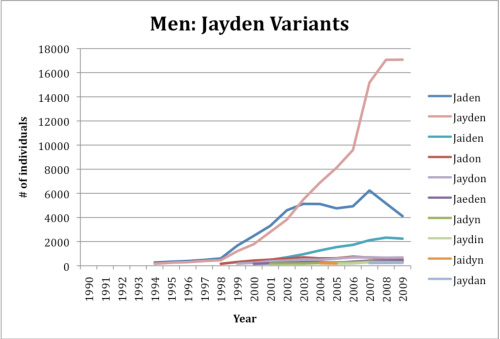
Main Menu - Misc. - Clothing/Textiles - Medieval Wales - Names - Other Medieval - Publications - Harpy Publications
Part II: The diverse roots of the Aidan-Rhyme names
Part III: Near-rhymes and predictions for new candidates for popularity
There are several possible sources for this name. There is a Biblical Jadon in the Book of Nehemiah but this spelling is a late-comer to the fashion, making it less likely as an origin. There is a French surname Jadin (probably from an occupational surname meaning "seller of bowls and pans" -- Dauzat), but in addition to the problem that this spelling never gets into the top 1000, it doesn't seem to have been a significant surname in the U.S. For the most part, the Jaden group seems to have been coined for the sound, or composed from elements taken from other popular names, such as Jay or Jason. Another component to this name is the general popularity of names of the form "CVCVC" (where C=consonant and V=vowel) ... but that's a topic for another column.
The Jaden group first shows up on the charts in 1994 as Jaden and Jayden and adds more variants rapidly: Jadon in 1998, Jaiden and Jaydon in 1999, Jaeden in 2000, Jadyn in 2001, and Jaidyn and Jaydin in 2004. All together they make up 7.9 out of every 1000 boys names in 2005. As with Aidan, there’s a sharp increase in popularity starting after 1998 to go along with the increase in spelling variants.
Attested spelling variants that haven't made the charts include Jaidon, Jadan, and Jadin.

To see the detail on the lesser-used spellings, let's expand the scale to show only the part from 0-2000 individuals per year.
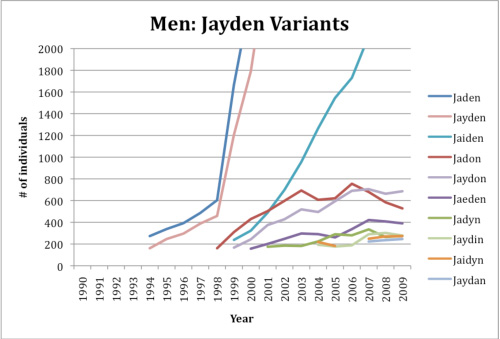
As with Jaden, although there are several possible sources from which Caden/Kaden could have derived, the simplest explanation for much of its popularity seems to be purely as a name coined for the sound or created by cutting and pasting together parts of existing names. For the hypothetical sources, there's the town of Caden in Brittany (in France), which is spelled Kaden in Breton. Perhaps a more likely source in the U.S. is the Irish surname Mac Adáin (son of Adam), which has been rendered in English as Mac Caddane, Mac Coddan, Mac Cadden, and other similar spellings. (Woulfe Mac Adáin) And in many cases it may have been reinvented, based not only on Aidan but on names like Cade (which shows up on the chart a decade before Caden).
The pattern of increasing popularity is very similar to Jaden, with a similar proliferation in spellings, although the numbers are slightly less. We start out with Caden in 1992 adding Kaden in 1993. These two spellings dominate the field and stay nearly equal to each other in numbers, but in 1999 we add Cayden and Kadin, in 2000 we find Kaiden and Kayden, in 2001 Caiden is added, then in 2003 Kaeden and in 2005 Kadyn. Although the C/K spelling pairs don't always make the cut-off for the charts in the same year, for the most part they have similar popularity, as the chart below shows.
Like the two names already discussed, 1998 not only sees the beginning of new spellings being added, but it marks a sudden change in the rate of increasing popularity. By 2005, this group of names represents 6.9 out of every 1000 boys’ names.
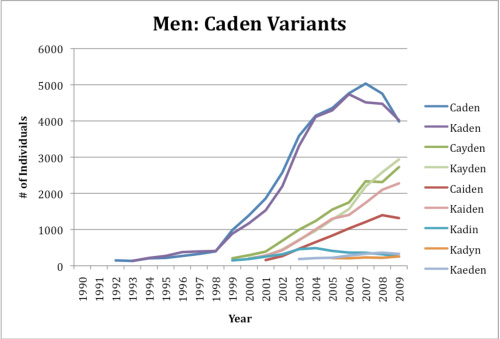
There are several English place names that contributed to this group (by way of surnames): Braydon in Wiltshire and Bradon in Somerset, both with the same obscure deriation and appearing in historic sources as Bradon, Bradene, and Braden. Bradden in Northampton, meaning "broad valley", with historic spellings including Bradene, Braddene, Braddon, and Bradon. Bredon in Worcestershire, one of those delightful redundantly-layered compounds meaning "hill hill", with spellings including Breedon, Breeden, Breadon. Breydon in Norfolk, meaning something equivalent to "a broadening, a place where a river widens out". (Eckwall Braydon, Braden, Bradden, Bredon, Breydon) A less common origin is from a nickname meaning "broad hand". (Reaney & Wilson Bradden)
But names with this sound can also come from the Irish surname Ó Bradáin, from a root meaning "salmon", which has been Anglicized at various times as Bradane, Bradan, Bradden, Bradan, Bradden, Bredin, Breadon, and probably various other things. (Woulfe Ó Bradáin, MacLysaght Bradden, Bredin)
This really points up the problem with trying to provide a single, unambiguous origin and meaning for a modern name. If parents are giving a child a name in this group based on family history, then it may be possible to say "this name means X". But if they picked it for the sound, then all of these origins are equally accurate or inaccurate. (This is why one of the most maddening random questions that an onomasticist gets is, "What does my name mean?")
This name-group first shows up on the charts in 1991 as Brayden, then starts adding more spelling variants in 1996 (Braydon, Braeden), 1999 (Braedon, Braiden), and 2002 (Bradyn). It doesn’t take quite as sharp an upward turn in 1998 that Aidan, Caden, and Jaden do, but there's still a noticeable uptick at that point followed by an explosion of spelling variants. It ends up at a respectable but less ambitious 3.9 names per 1000 boys in 2005 for all the spelling variants combined.
In addition to getting some momentum from the Aidan-rhyme group, the Braydon group also fits in with a somewhat earlier sound-fashion for names (especially men's names) starting with "Br-" and with some subset of the consonant sequence Br-n-d-n (e.g., Brady, Brad, Brian, Brand, Brendan, Brandon, Brennan) which took off as a group in the '40s and '50s and were still going strong in the '90s when Brayden shows up. (This is a topic for yet another future blog entry.)
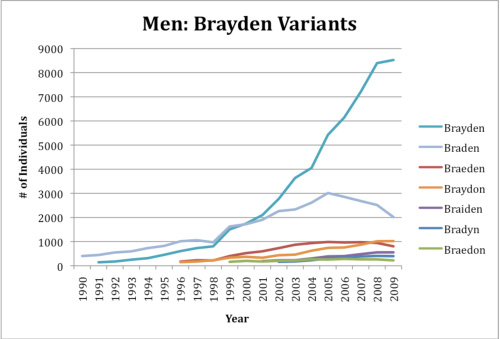
There are multiple places in England named Hayden that produced surnames with historic spellings such as Haiden, Haydon, Hedon, Heiden, Heidon, Heidun, Heydon, and Hayden. They may not all have the same origin but the possible meanings are range from "hay meadow", "hay valley", "hay hill" to "hedged meadow". Another possible contribution comes from the surname Hadden, which comes both from multiple places of that name or from a variant of the place-name Halden. Historic spellings include Haddun, Haddon, Hadden. It seems more likely, though, that the modern spelling Haden has been reinvented, rather than being derived from the surname Hadden. (Eckwall Haydon, Heydon, Haddon, Halden; Reaney & Wilson Hayden, Hadden)
This name group has the earliest appearance on the popularity charts of any of the Aidan rhymes. It sits around the bottom end of the top 1000 boys’s names from the earliest available data in 1880 until the middle of the 20th century, occasionally climbing a bit, but never making it even as high as the 500s in the rankings. After 1947, it disappears entirely from the charts until 1986. Then after a few years in the lower end of the top 1000, it starts shooting up in 1990 and makes it up into the top 100 in 2002. Two spelling variants are added: Haden in 2001 and Haiden in 2004. Even more so than Braydon, there isn’t a sharp increase in popularity around 1998, just the steady rise starting in the early 1990s. Overall, it’s the least popular of the Aidan rhymes, ending up at 2.9 per 1000 boys’ names in 2005.
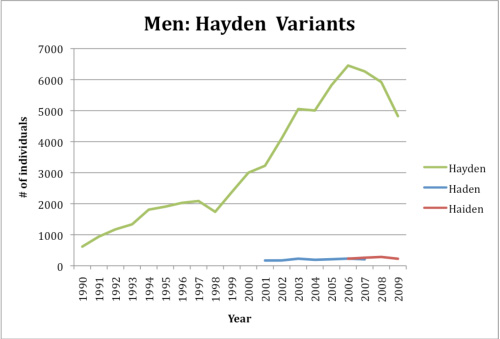
Overall the Aidan-rhyme names make up 4.5 out of every 100 boys’ names given in 2009. Not quite enough to expect one in every classroom, but still a lot. The sudden rise in popularity around 1998 is even more striking when you look at the aggregate data in graphic form (taking only the numbers from 1990 onward). In 2008 and 2009 4.5% of all boys in the U.S. were named something rhyming with Aidan.
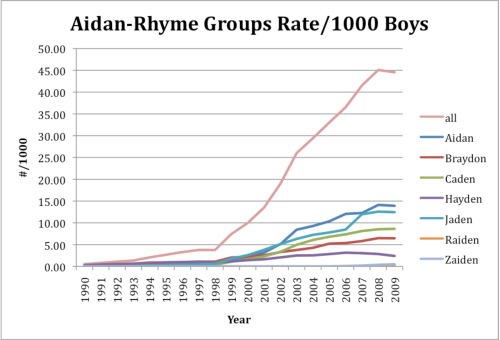
Brief bibliography of cited research sources
Dauzat, Albert. Dictionnaire Étymologique des Noms de Famille et prénoms de France. Paris: Larousse, 1987.
Ekwall, Eilert. The Concise Oxford Dictionary of English Place-names. New York: Oxford University Press, 1991. ISBN 0-19-869103-3
MacLysaght, Edward. The Surnames of Ireland. Dublin: Irish Academic Press, 1980.
Reaney, P. H. & Wilson, R. M. A Dictionary of English Surnames. New York: Routledge, 1991. ISBN 0-415-05737-X
Woulfe, Patrick. Sloinnte Gaedheal is Gall - Irish Names and Surnames. Baltimore: Genealogical Publishing Company, 1967.
Thanks also to Google and Wikipedia
Continue to In Aid of Aidan: Part III -Near-rhymes and predictions for new candidates for popularity
Return to Index of Name Essays
This site belongs to Heather Rose Jones. Contact me regarding anything beyond personal, individual use of this material.
Unless otherwise noted, all contents are copyright by Heather Rose Jones, all rights reserved.